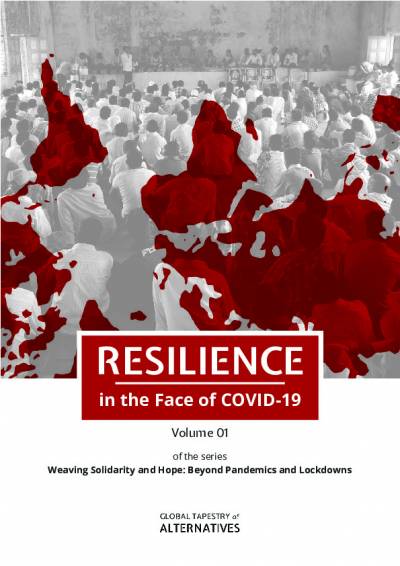Volume 1: "Resilience in the Face of COVID-19"
Volume 1: "Resilience in the Face of COVID-19"
Introduction
These times define a historical moment where the current structural inequalities have exposed the ugly systems of oppression. The COVID-19 pandemic has shown the deep fractures and the baseless promises of well-being that the capitalist model made to the whole world. Neither the market nor the State will be able to take care of a vast number of peoples, except in a transitory and limited way. People’s struggles for survival and their expression of agency will be a significant factor in defining the outcome of these exceptional circumstances. It has shown to us, especially the ones who pretend to be blind and deaf, that the earth is alive. Not only alive, but she can in no time wipe out the static edifices that humans pride upon. The crisis points to the terrible physical, cultural, and spiritual alienation of Homo Industrius from its own home ‘oikos’.
Over the past two years, the COVID-19 crisis has been well documented, highlighting the plight of the working class, small scale farmers, fisherfolk, indigenous peoples, urban migrants and many people living in the margins of our societies. Our access to basic needs such as food, shelter, water, housing and human contact have all been threatened, affecting millions, if not billions. It also shed light on our folly of depending on long distance exchanges and trade for meeting basic needs. It has shown the deep links between ecological devastation and socio-economic deprivation. Overall, the inequality and unsustainability of predominant models of ‘development’ have been clearly demonstrated.
While the immediate humanitarian crisis is visible and has generated widespread spontaneous initiatives by civil society and by several governments to provide relief, much less common are attempts to address root structural causes. It is vital that we use this opportunity to simultaneously rethink the economic, social, political, cultural and ecological approaches to life. We need to urgently find alternative pathways of well-being that help generate dignified livelihoods for all and that help us move towards ecological sustainability. We have to construct an atmosphere of hope against the politics of fear—keeping mutual care and healing at our core. We need to facilitate the self-empowerment of communities (rural, rurban, urban) while building their capacity to govern and manage food, health, water, energy, shelter, education, and other basic needs and aspirations in ways that reach towards self-reliance and, wherever possible, self-sufficiency. And we need to recognise that the earth belongs not to humans alone, but to millions of other species, and that as an integral part of nature we have to be responsible custodians.
However desperate the current situation has been, communities across the world have responded to the crises with resilience, care, innovation, and adaptability. The resurgence of life that we see in innumerable actions of solidarity, cooperation, love, and care in these times are rooted in the aeons-old articulations of indigenous peoples and local communities. This spirit circulates among many grassroots expressions of collectives and networks, as dignified rage against systems of oppression as well as the affirmation of their resolve to defend their dignity by articulating a pluriverse of alternatives.
This is the first volume of a collection of various narratives from around the world based on collaborative writing. Together, they provide us multifaceted expressions of resistance to dominant forms of oppression—to defend local ways of life, strengthen local autonomy, and reconstruct societies. These examples show that COVID-19 and the problems it has highlighted in society (all of which have been around for much longer, of course, but are more sharply visible now) have solutions—already demonstrated by communities, initiatives and civil society. They give important lessons and pathways for just, equitable, and ecologically resilient futures.
Download it
Here you can download the PDF version of the report
The resurgence of life that we see in innumerable actions of solidarity, cooperation, love, and care in these times are rooted in the aeons-old articulations of indigenous peoples and local communities.
Credits
This document has been coordinated and put together by Shrishtee Bajpai and Upamanyu Das with inputs from GTAGlobal Tapestry of Alternatives core team members Ashish Kothari, Franco Augusto, Vasna Ramasar, Patricia Botero Gomez, and Gustavo Esteva.
How to cite
Global Tapestry of Alternatives (2021). "Resilience in the face of COVID-19". Weaving Solidarity and Hope: Beyond Pandemics and Lockdowns – Volume 1. Available at: https://globaltapestryofalternatives.org/reports:pandemic:01
